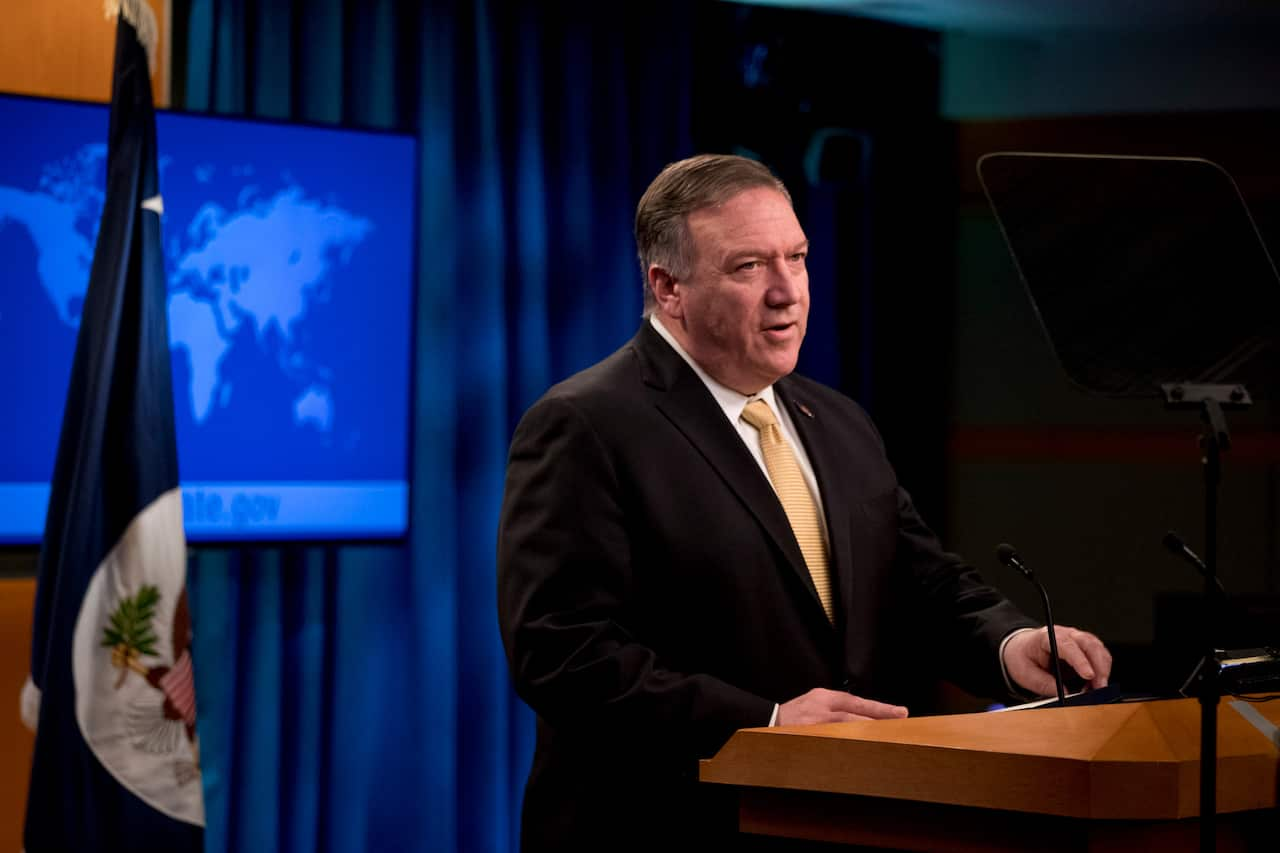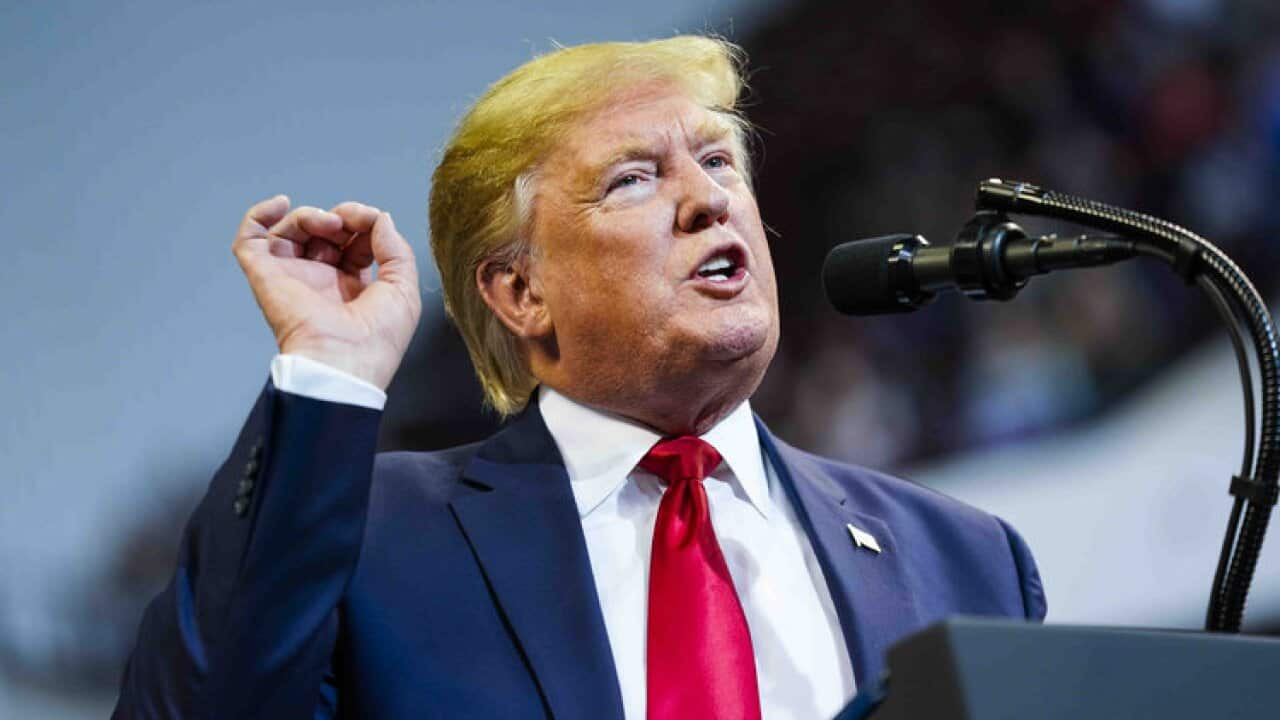A senior US diplomat said on Wednesday that President Donald Trump expressly ordered him and others to help a pressure campaign against Ukraine, and gave testimony in the impeachment inquiry that for the first time put the US secretary of state and vice president at the heart of the controversy.
Gordon Sondland, the US ambassador to the European Union, said he “followed the president’s orders” to work with Mr Trump’s personal lawyer Rudy Giuliani to push Ukraine to carry out two investigations that would benefit Mr Trump politically as he runs for re-election in November 2020.
Mr Sondland’s testimony was among the most significant in the four days of public hearings in the Democratic-led House of Representatives impeachment inquiry that has captivated Washington and threatens the presidency of Mr Trump, a Republican.

Sondland told the inquiry 'there was a quid pro quo in Ukraine scandal.' Source: AP
The ambassador, a wealthy hotel entrepreneur and Trump donor, detailed Mr Trump’s active participation in the Ukraine controversy. Mr Sondland depicted Secretary of State Mike Pompeo as actively engaged in the efforts to get Ukraine to carry out the investigations, including one targeting Democratic presidential candidate Joe Biden, and described Vice President Mike Pence as aware of the efforts.
Going much further in describing the broad involvement of administration officials than he did in prior testimony behind closed doors, Mr Sondland also made clear that he was a reluctant participant in the pressure campaign on Ukraine and that he personally opposed Mr Trump’s withholding of US security aid.
“Everyone was in the loop. It was no secret,” Mr Sondland said.
Testifying to the House Intelligence Committee, Mr Sondland said he told Mr Pence that a freeze ordered by Mr Trump of $391 million in security aid to Ukraine appeared to be part of the pressure campaign. The aid was approved by Congress to help Ukraine fight Russia-backed separatists. In a statement, Mr Pence’s chief of staff denied that any such conversation occurred.
Mr Trump in a July 25 phone call asked Ukrainian President Volodymyr Zelenskiy to carry out two investigations. One involved Mr Biden and his son Hunter, who had worked for Ukrainian energy company Burisma. The other involved a debunked conspiracy theory promoted by some Trump allies that Ukraine, not Russia, interfered in the 2016 US election.
Democrats accuse Mr Trump of abusing his power by using the security assistance and an offer to Mr Zelenskiy of a prestigious visit to the White House as leverage to pressure a vulnerable US ally to dig up dirt on domestic political rivals.
Mr Sondland described Mr Trump in May telling him along with Energy Secretary Rick Perry and then-US special envoy to Ukraine Kurt Volker to work with Mr Giuliani - the former New York mayor who held no US government job - on Ukraine policy.
“We did not want to work with Mr Giuliani. Simply put, we played the hand we were dealt. We all understood that if we refused to work with Mr Giuliani, we would lose an important opportunity to cement relations between the United States and Ukraine. So we followed the president’s orders,” Mr Sondland said.
Mr Sondland said the three worked “at the express direction of the president of the United States” with Mr Giuliani, who at the time was actively trying to get Ukraine to conduct the politically motivated investigations.
The efforts by Mr Giuliani to get Mr Zelenskiy to investigate the Bidens “were a quid pro quo for arranging a White House visit” for the Ukrainian leader, Mr Sondland said, using a Latin term meaning to exchange a favour for another favour.

US President Donald Trump speaks to the media about the impeachment proceedings on Wednesday. Source: AAP
Mr Trump has said he did nothing wrong in the Ukraine matter and specifically denied any quid pro quo. On Wednesday, the president said he does not know Mr Sondland - his own appointee - well but he seems like a “nice guy.”
Mr Biden, the former vice president, is a leading candidate for the Democratic nomination to face Mr Trump in the November 2020 presidential election. Mr Trump has accused Mr Biden of corruption without offering evidence. Mr Biden has denied any wrongdoing.
Pompeo focus
The investigation could lead the House to approve formal charges against Mr Trump - called articles of impeachment - that would be sent to the Republican-controlled Senate for a trial on whether to remove him from office. Few Republican senators have broken with Mr Trump.
The committee’s top Republican, Devin Nunes, accused Democrats of waging an “impeachment crusade” against Trump.
“They know exactly what kind of damage they’re inflicting on this nation. But they’ve passed the point of no return,” Mr Nunes said.
Mr Sondland’s testimony cast more light on the role of Mr Pompeo, a close Trump ally who has declined to defend State Department witnesses who have been attacked by Mr Trump and other Republicans for cooperating with the impeachment inquiry.

US Secretary of State Mike Pompeo Source: AAP
Mr Sondland provided correspondence showing he and Pompeo communicated about his effort to get Mr Zelenskiy to commit to undertake investigations as a way to free up the security aid, which was provided in September after the controversy had become public.
“All good. You’re doing great work; keep banging away,” Mr Pompeo told Sondland in early September, according to email correspondence cited in his testimony.
Mr Sondland said even as late as September 24, the day the House launched its impeachment inquiry, Mr Pompeo was directing Mr Volker to speak with Mr Giuliani.
Mr Pompeo, on a visit to Brussels, ignored reporters’ questions about Mr Sondland’s testimony.
Mr Sondland said he told Mr Pence in September “that I had concerns that the delay in aid had become tied to the issue of investigations.”
“The vice president nodded, he heard what I said, and that was pretty much it,” Mr Sondland testified.
Adam Schiff, the Intelligence Committee’s Democratic chairman, called Mr Sondland’s testimony “a very important moment in the history of this inquiry.”
“It goes right to the heart of the issue of bribery as well as other potential high crimes and misdemeanours,” Schiff told reporters, referring to impeachable offences mentioned in the US Constitution. “But we also have heard for the first time that knowledge of this scheme was pervasive.”

House Intelligence Committee Chairman Adam Schiff, left, talks with ranking member Devin Nunes, right. Source: AAP
Mr Sondland testified he was “adamantly opposed” to the suspension of the security aid because “the Ukrainians needed those funds to fight against Russian aggression.”
“In the absence of any credible explanation for the suspension of aid, I later came to believe that the resumption of security aid would not occur until there was a public statement from Ukraine committing to the investigations of the 2016 election and Burisma, as Mr Giuliani had demanded,” Mr Sondland testified.
Mr Sondland, tapped as Mr Trump’s envoy after he donated $1 million to the president’s inauguration, said Mr Trump told him there was no quid pro quo but that Mr Zelenskiy should “do the right thing.”
'I want nothing'
President Donald Trump sought Wednesday to distance himself from US envoy Gordon Sondland as he made an explosive appearance before an impeachment hearing, while also asserting that his testimony had exonerated him entirely.
"I don't know him very well. I have not spoken to him much," Mr Trump told reporters at the White House, after the ambassador to the EU testified that he followed the president's orders in seeking a "quid pro quo" deal with Ukraine.
In an October 8 tweet, Mr Trump had described his ambassador to the European Union as "a really good man and great American."
Mr Trump went on to read from notes on Mr Sondland's ongoing testimony, saying it demonstrated he did not pressure Ukrainian President Volodymyr Zelensky to investigate his political rival Joe Biden.

US President Donald Trump held handwritten notes as he spoke to the media about the impeachment hearings. Source: AP
"It was a very short and abrupt conversation that he had with me," Mr Trump said.
"'What do you want from Ukraine,'" the president quoted Mr Sondland as asking him. "Here is my response, that he gave. Just gave. Ready? You have the cameras rolling?"
"Here is my answer: 'I want nothing. I want nothing. I want no quid pro quo. Tell Zelensky to do the right thing,'" added the president, who reenacted the exchange several times to the reporters gathered on the South Lawn.
"Then he says: this is the final word from the President of the United States. I want nothing."
"I would say that means it's all over," Mr Trump said.



